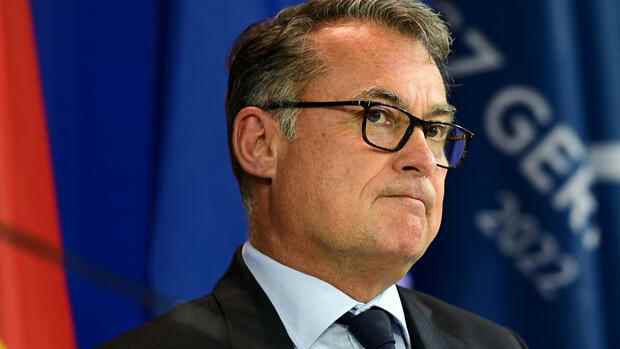“Monetary policy must react decisively to preserve the credibility of the inflation target.”
(Photo: Reuters)
Frankfurt Bundesbank President Joachim Nagel is also campaigning for a sharp rise in interest rates in view of the extraordinary surge in inflation in the euro area. “Monetary policy must react decisively in order to preserve the credibility of the inflation target,” Nagel said in a speech in Berlin at the European School of Management and Technology (ESMT), according to the manuscript.
Otherwise, companies, private households and collective bargaining parties might lose faith in the medium-term inflation target. “Inflation rates will not return to the central bank’s inflation target on their own,” he said.
In July, inflation in the euro zone reached a record 8.9 percent. The rate is four times higher than the inflation target of the European Central Bank (ECB), which sets two percent as the optimal value for the economy.
How consumer prices developed in August should become clear this Wednesday. Then the European statistical office Eurostat presents its first estimate. Economists expect an increase to 9.0 percent. In view of the surge in energy prices as a result of the Ukraine war, double-digit rates are not being ruled out for the fall.
Top jobs of the day
Find the best jobs now and
be notified by email.
According to Greek central bank chief Yannis Stournaras, inflation in the euro area will peak in 2022. “In my view, we will see inflation peak this year and then a steady slowdown,” the ECB Governing Council member told a conference in Alpbach, Austria, on Tuesday. Inflation will gradually decline in 2023 and then approach the central bank’s target in 2024.
On Tuesday, the Federal Statistical Office announced inflation in Germany in August: Prices rose by 7.9 percent compared to the previous year.
Support for July rate hike
As the Bundesbank President explained, data from a number of countries show that bringing forward interest rate hikes – central bankers refer to this as “front-loading” – reduces the risk of an economic downturn. In July, the ECB initiated the turnaround in interest rates due to escalating inflation and, contrary to what had been promised, raised interest rates by a strong 0.50 percentage points. It was the first rate hike since 2011.
The key interest rate is now 0.50 percent. A sharp rate hike is also expected for the next interest rate meeting on September 8th. In the meantime, several euro central bankers have spoken out in favor of discussing an even larger hike of 0.75 percentage points.
Nagel did not say in the speech how big he thinks the next rate hike should be. However, he noted that he supported the sharp rate hike in July. “Because in my view, a larger rate hike reduces the risk of inflation expectations becoming detached,” he said.
In addition, this reduces the risk that the ECB will later have to increase too drastically. “We shouldn’t delay further rate hikes for fear of a possible recession.” “So react more strongly to a deviation of the inflation rate from the target inflation rate,” he added.
According to Nagel, it is currently not possible to estimate the level to which the central bank will ultimately raise key interest rates. “In my opinion, given the great uncertainty, it is not yet possible to foresee how high the key interest rates will rise,” he explained. According to Nagel, in which stages and to what extent the ECB raises interest rates depends on how the assessment of the inflation outlook develops.
The Dutch currency watchdog is calling for decisive action in the face of high inflation.
(Photo: Reuters)
In the opinion of the head of the Dutch central bank, Klaas Knot, the ECB may have to raise interest rates above the level at which the economy is neither boosted nor slowed down in order to combat inflation. Central bankers speak of the so-called neutral interest rate level.
At a Danske Bank roundtable on Tuesday, Knot also signaled that he is leaning towards a 0.75 percentage point hike in key interest rates at the next rate meeting. But he is open to discussion, he added.
More: German inflation rises to 7.9 percent

